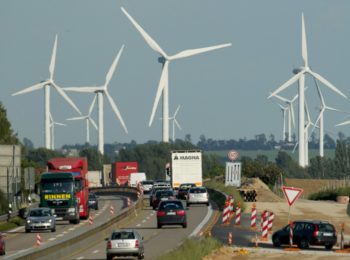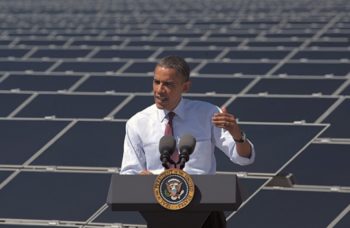
In it he writes: “Contradictions of German climate policy – high subsidies for green energies and high electricity prices, yet CO2 emissions hardly fall.”
The article summarizes: “Germany’s energy transition is expensive – and rather ineffective.”
Weimann comments on Germany’s skyrocketing electricity prices, which are now among the world’s highest – due especially to the disastrously failed implementation of the Energiewende (transition to renewable energies).
Twenty-five billion euros a year for almost nothing
Weimann describes how politicians and proponents like boasting that “much has been accomplished so far” but points out that CO2 emissions have not fallen in close to a decade, despite the whopping 25 billion euros that are poured in through feed-in tariffs each year.
“An extremely poor result,” Weimann concludes.
A 1,000 citizens protest groups against wind
Moreover, nationwide public acceptance of wind power has shriveled away as more than 1,000 citizens initiatives have formed against the erection of wind parks and their environmental destruction.
Only three percent of Germany’s primary energy needs
Weimann calls the claim that one third of the country’s electric power is being supplied by green energies misleading, and reminds readers that wind and sun, in fact, supply only 3.1 percent of Germany’s primary energy needs, which he characterizes as: “Gigantic effort, ridiculously low returns – that is the reality of German climate policy.”
Completely ineffective with regard to CO2 emissions
He also says because of the EU’s emissions trading scheme, it will ensure that “Germany’s sole efforts in climate policy remain completely ineffective with regard to CO2 emissions.”
Weimann also characterizes Germany’s approach to reducing CO2 as “central planning and subsidy drive” and will end up costing 1 to 2 trillion euros, according to leading experts at the Technikakademie Acatech.
“That’s an amazing amount.”
An amount, Weimann writes, that “never seemed to concern German climate policymakers”.
Coal plants to shut down next
Weimann also describes that in Germany’s desperation to meet its CO2 reductions target, the country plans to shut its coal power plants.
But that too will achieve nothing, he writes, because Germany will only end up importing coal and nuclear-generated electricity from neighboring countries – like Poland.
German green nationalism
At the end of the commentary Weimann slams German policymakers, who like claim they are “convinced Europeans”:
But German climate politicians seem to think like nationalists. Thinking beyond the borders of Germany is not their thing. This is perhaps the biggest contradiction in German climate policy.”
===========================================
Prof. Dr. Joachim Weimann holds the Chair of Economic Policy at the University of Magdeburg.
Read more at No Tricks Zone

















This post estimates of the additional costs being incurred over Gas-firing for electricity generation that are being spent and will continue long-term to support installations of Weather Dependent Renewables in Western economies.
Thus these calculations estimate a significant part of the capital and future costs of “Green Virtue Signalling” to the West.
Weather Dependent Renewables are both more expensive to install and to run long-term than using Gas-firing, so this calculation estimates the overspend needed for Renewables to input the same amount of power to the grid: these overspends show the impact of the low capacity factors achieved by Wind Power and Solar PV as well as the additional costs of installing Renewables. They do not account for the additional associated costs of unreliability and intermittency
https://edmhdotme.wordpress.com/a-billion-here-a-billion-there-suddenly-youre-talking-real-money/
How many Birds and Bats will be effected by those wind turbines how many people will lose sleep at night with those damn things whirling all night long making a terrible noise I f they could tear down the Berlin Wall they can tear down those Wind Turbines
My guess is that most Germans realize that energiewende is a very expensive failure. The problem is a strong majority of Germans believe in the fraud of anthropological climate change. If they don’t have energiewende to address the “problem,” then what do they have?
They would be better off to pursue climate change adaptations. This policy is much less expensive, and in some cases, such as developing heat tolerant crops, has some benefits.
“Twenty-five billion euros a year for almost nothing”
Almost nothing until you consider the “nothing” is all based on a LIE.